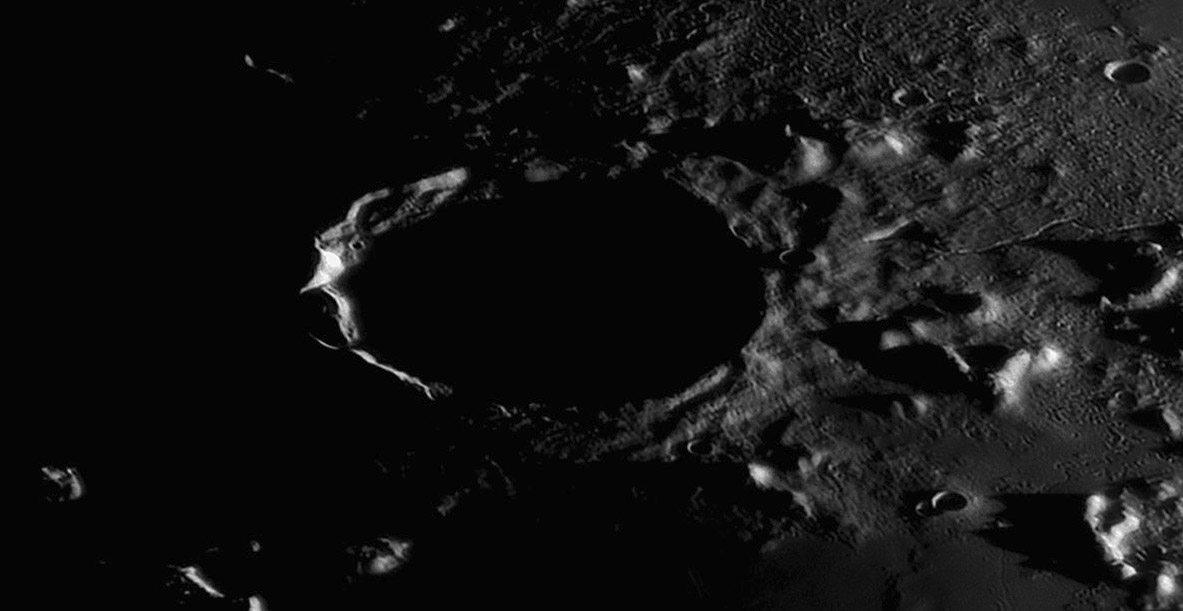Difference between revisions of "February 28, 2010"
| Line 3: | Line 3: | ||
<!-- ws:start:WikiTextHeadingRule:1:<h1> --> | <!-- ws:start:WikiTextHeadingRule:1:<h1> --> | ||
<!-- ws:start:WikiTextLocalImageRule:16:<img src="/file/view/LPOD-Feb28-10.jpg/123595839/LPOD-Feb28-10.jpg" alt="" title="" /> -->[[File:LPOD-Feb28-10.jpg|LPOD-Feb28-10.jpg]]<!-- ws:end:WikiTextLocalImageRule:16 --><br /> | <!-- ws:start:WikiTextLocalImageRule:16:<img src="/file/view/LPOD-Feb28-10.jpg/123595839/LPOD-Feb28-10.jpg" alt="" title="" /> -->[[File:LPOD-Feb28-10.jpg|LPOD-Feb28-10.jpg]]<!-- ws:end:WikiTextLocalImageRule:16 --><br /> | ||
| − | <em>image by [mailto:raffaele.barzacchi@fastwebnet.it | + | <em>image by [mailto:raffaele.barzacchi@fastwebnet.it Raffaele Barzacchi], Italy</em><br /> |
<br /> | <br /> | ||
We mostly observe areas of the Moon that are illuminated. but sometimes the lack of light creates patterns that are evocative and informative. Here the first rays of sunrise reflect brightly from the upper walls of Plato, and faintly from the exterior eastern rim. This emphasizes that the inner wall is steep and relatively smooth, accounting for the brightness, whereas the outer rim has a low slope covered with boulders and rubble.<br /> | We mostly observe areas of the Moon that are illuminated. but sometimes the lack of light creates patterns that are evocative and informative. Here the first rays of sunrise reflect brightly from the upper walls of Plato, and faintly from the exterior eastern rim. This emphasizes that the inner wall is steep and relatively smooth, accounting for the brightness, whereas the outer rim has a low slope covered with boulders and rubble.<br /> | ||
<br /> | <br /> | ||
| − | <em>[mailto:tychocrater@yahoo.com | + | <em>[mailto:tychocrater@yahoo.com Chuck Wood]<br /> |
I leave for the 41st Lunar and Planetary Science Conference today and will try to post some results from the meeting.</em><br /> | I leave for the 41st Lunar and Planetary Science Conference today and will try to post some results from the meeting.</em><br /> | ||
<br /> | <br /> | ||
| Line 17: | Line 17: | ||
<br /> | <br /> | ||
<hr /> | <hr /> | ||
| − | <div>You can support LPOD when you buy any book from Amazon thru [http://www.lpod.org/?page_id=591 | + | <div>You can support LPOD when you buy any book from Amazon thru [http://www.lpod.org/?page_id=591 LPOD!]<br /> |
</div> | </div> | ||
---- | ---- | ||
===COMMENTS?=== | ===COMMENTS?=== | ||
| − | + | Register, and click on the <b>Discussion</b> tab at the top of the page. | |
Revision as of 17:16, 11 January 2015
Hole Full of Shadow

image by Raffaele Barzacchi, Italy
We mostly observe areas of the Moon that are illuminated. but sometimes the lack of light creates patterns that are evocative and informative. Here the first rays of sunrise reflect brightly from the upper walls of Plato, and faintly from the exterior eastern rim. This emphasizes that the inner wall is steep and relatively smooth, accounting for the brightness, whereas the outer rim has a low slope covered with boulders and rubble.
Chuck Wood
I leave for the 41st Lunar and Planetary Science Conference today and will try to post some results from the meeting.
Technical Details
Jan 23, 18:38 UT. C14 XLT, f/20 + R+IR filter.
Related Links
Rükl plate 3
COMMENTS?
Register, and click on the Discussion tab at the top of the page.



